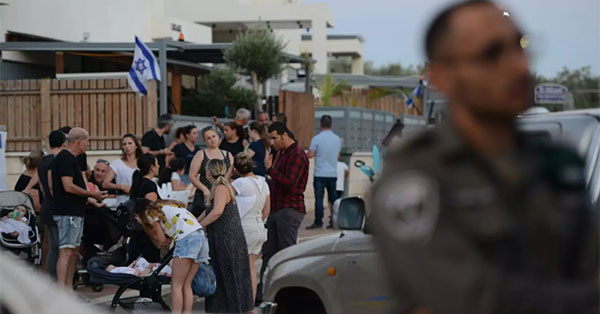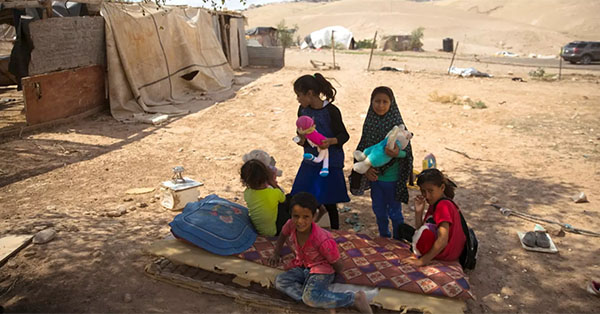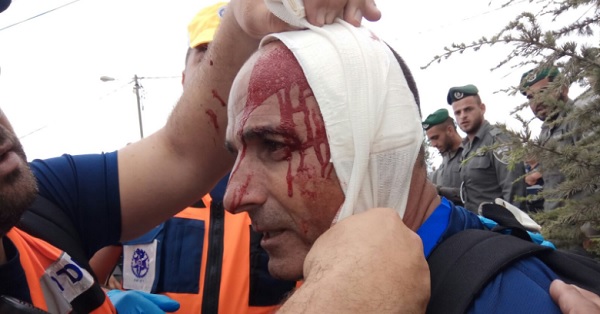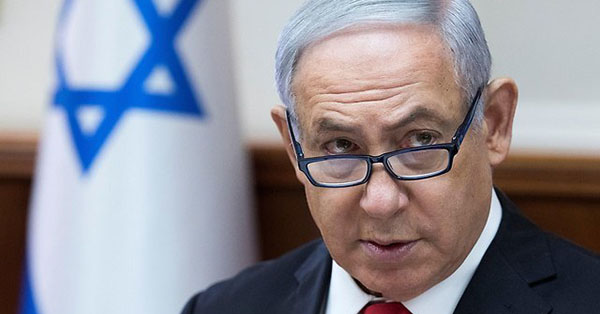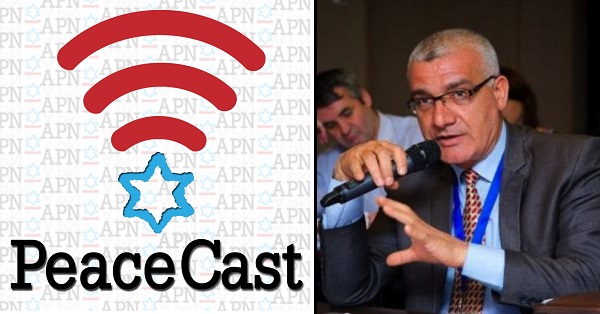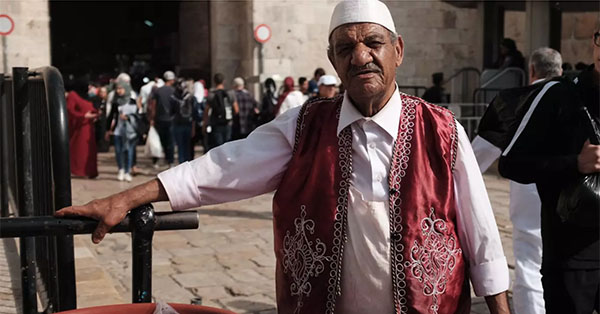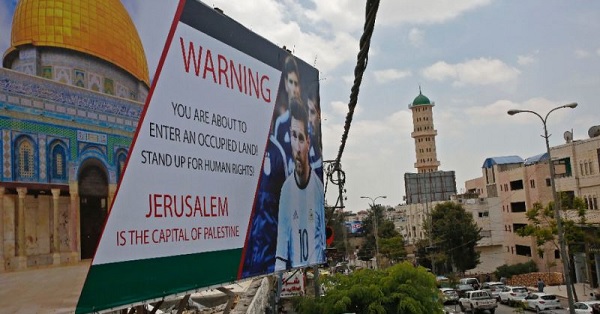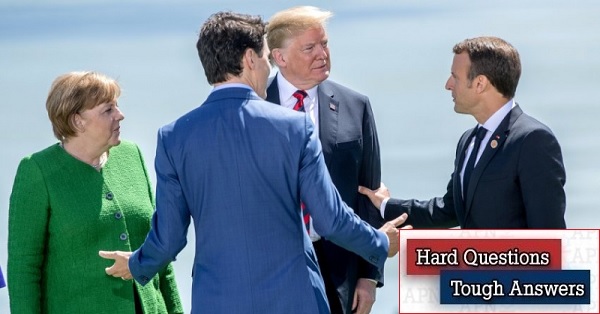Produced by the Foundation for Middle East Peace in cooperation with Americans for Peace Now, where the Legislative Round-Up was conceived
--Sarah Idan, aka “Miss Iraq,” said during her visit this week to Israel where she met up with her friend, "Miss Israel," from the 2017 Miss Universe contest. Idan’s family was forced to flee Iraq after she posted a selfie of the two women in 2017.
You Must Be Kidding:
And while this week Miss Iraq visited Israel and the new political leader of Iraq called for Iraqi Jews to return to Iraq, dozens of Israelis in the Israeli city of Afula demonstrated yesterday again against the sale of a home to an Arab-Israeli family. And while the police last month detained 21 peaceful Arab-Israeli protesters in Haifa and injured seven of them, it "settled" for restraining the Jewish-Israeli protesters in Afula to the curbs and detained none.
—Part of a letter written this week by former Jewish Agency chairman, Sallai Meridor, slamming his fellow settlers at Kfar Adumim settlement where he lives, for their actions to get rid of their Bedouin neighbors, the village of Khan al-Ahmar.*
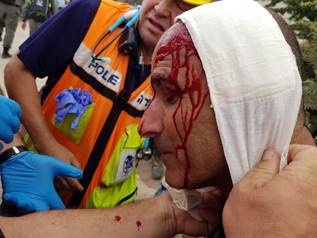 Take a look at this photo.
Take a look at this photo.
It shows an Israeli police officer suffering a head injury yesterday in the West Bank, just south of Bethlehem. Who attacked him? A Palestinian? Hamas? No. Rock-throwing Jewish settlers.
These hoodlums were part of a crowd of hundreds of right-wing zealots who gathered at Netiv Haavot, an illegal outpost, to protect buildings that settlers built on stolen land, privately owned by Palestinians.
Yesterday’s clashes went on for hours. Settlers gathered in the structures and on roofs, pelting police officers with rocks, bottles, and paint canisters.
--Reza, an Iranian fan attending the World Cup, welcomed two Israeli Yedioth Ahronoth reporters he met at the hotel dining room.*
Quote of the Day #2:
״So I have this background that allows me to look at things from a different perspective, and to some extent that allowed me to make the movie, since I didn’t buy into the threats that most Israelis believe in – according to which most Palestinians are terrorists and it’s very dangerous to go there. My complicated identity allowed me to observe this from a slightly different angle.”
—Argentina-born Jewish Israeli filmmaker, Ines Moldavsky, made a prize-winning film about dating Palestinian men from the West Bank.**

Omar Shaban is the founder and director of PalThink for Strategic Studies, a Gaza City-based think tank, or as Shaban likes to call it, a “think and do tank.”
Debra Shushan, Stephanie Breitsman and Ori Nir sat with Shaban at APN’s office in Washington on Friday June 8th, for a long, fascinating conversation on the economy, society, and politics of the Gaza Strip.
—Like other Palestinians in E. Jerusalem, Marwan Sumara, 77, who sells juice in the Old City dressed in a white fez and traditional vest during Ramaddan, says Jerusalem Municipality officials are picking on him now and they didn’t in the past. Some think that the U.S. Embassy move to Jerusalem has emboldened Israeli authorities to act more aggressively towards the city’s Palestinian residents.*
You Must Be Kidding:
Israeli security guards at airport in Greece strip-search Arab Israeli couple before flight to Israel and demand to see their marriage license.**

By Elana Kravitz, APN intern
When you think about the Israeli-Palestinian conflict, the first thing that comes to mind usually isn’t soccer. But this week, a soccer game in Israel became a highly symbolic political pawn used by the Palestinians, and specifically the Boycott, Divestment, and Sanctions (BDS) movement, against Israel.
The match, scheduled for Saturday in Jerusalem, was intended to be a “friendly” warm-up game between the Argentine and Israeli national teams before the World Cup next week. Palestine Football Association chief Jibril Rajoub pressured Argentina to back out of the match, even going so far as to encourage Palestinians to “burn their Messi [jerseys] and pictures and renounce him.” In the wake of this encouragement, Argentine soccer players, especially Messi, received numerous threats, leading the team to pull out of the match citing concerns about safety.
Produced by the Foundation for Middle East Peace in cooperation with Americans for Peace Now, where the Legislative Round-Up was conceived
1. Bills, Resolutions, & Letters
2. Senate FY19 NDAA
3. Free Speech Watch: Kenneth Marcus Confirmed to Dept. of
Education
4. Hearings & Markups
5. On the Record
Yossi Alpher is an independent security analyst. He is the former director of the Jaffee Center for Strategic Studies at Tel Aviv University, a former senior official with the Mossad, and a former IDF intelligence officer. Views and positions expressed here are those of the writer, and do not necessarily represent APN's views and policy positions.
This week, Alpher discusses whether Kim Jung-un will show Iran how to fool Trump on nuclear issues; how the nuclear summit and its outcome in Singapore directly affect the US approach to Iran; where the so-called Libya precedent comes into the picture; and Trump's comment that abandoning the Iran nuclear deal is already paying off.
